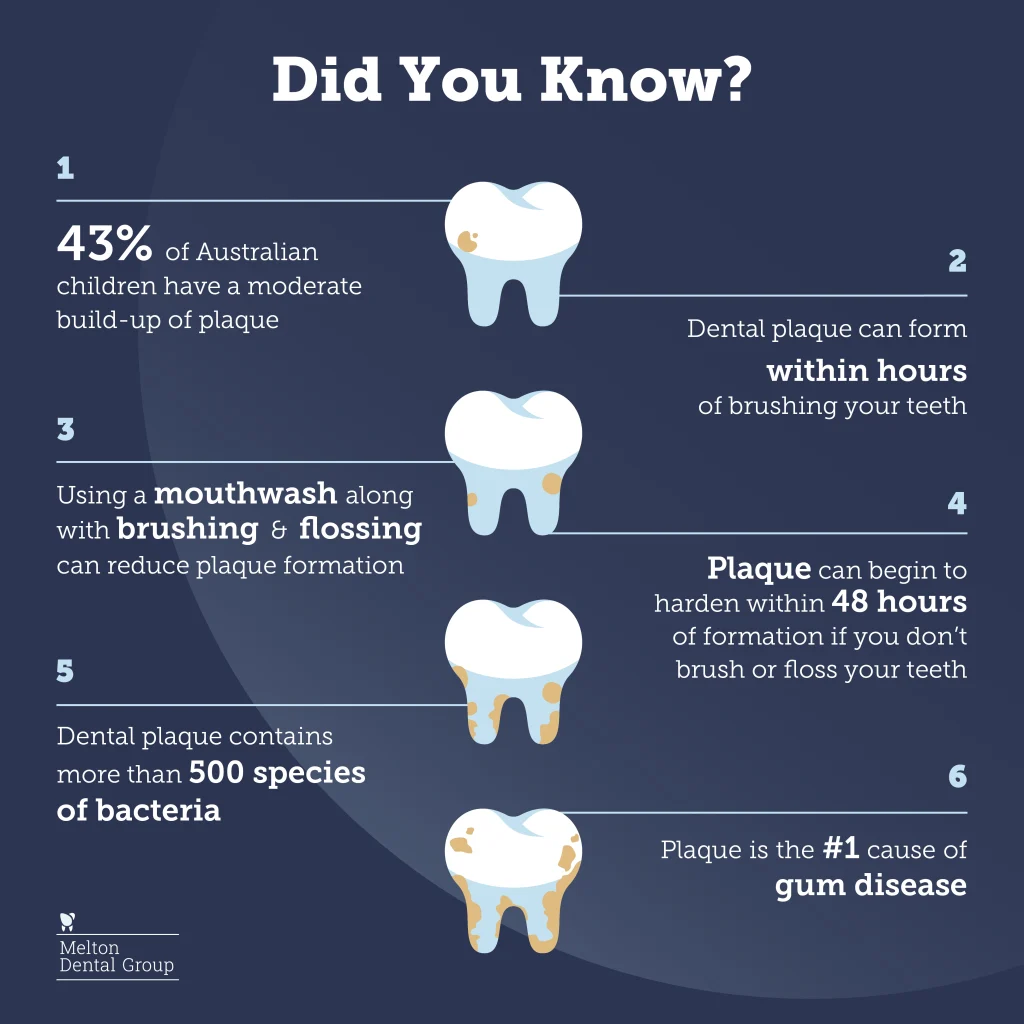Can a Dentist Remove Plaque?
April 11, 2024

A bright and beautiful smile is something everyone enjoys and desires. However, over time, dental plaque can form on your teeth. Left unchecked, this built-up plaque can harden and become tartar, causing severe dental problems that can damage your teeth and gums, making it important to remove plaque that has formed on your teeth.
While good oral hygiene is key to preventing plaque, that alone may not always be enough.
At Melton Dental, we offer safe and professional dental treatments to remove plaque and improve oral health and overall well-being.
What is Dental Plaque?
Dental plaque is a sticky, colourless film of bacteria that can form on your teeth, gums and even on dentures and braces. This happens when the bacteria in your mouth feed on leftover food particles to produce an acid that can break down the protective tooth enamel and irritate your gums. Plaque formation can also increase the risk of developing oral health problems like tooth decay and gum disease.
While dental plaque is not always visible, some telltale signs are:
- Yellowing teeth (especially along the gum line)
- Bad breath that doesn’t go away
- Swollen gums and bleeding after brushing
- A rough or fuzzy feeling when your tongue brushes against your teeth.
If plaque build-up is neglected, it can harden and turn into tartar. Also known as dental calculus, tartar has a darker shade than plaque and can appear in the form of a yellow or brownish deposit on your teeth. You won’t be able to brush or floss tartar away and only a dentist will be remove it.
While plaque formation can be managed with brushing and flossing, you won’t be able to prevent it from developing entirely. Our dentists at Melton Dental can help you remove plaque and tartar build-up with professional dental cleaning.

How Can I Prevent Plaque Build-Up?
Keeping your teeth and gums healthy with good oral hygiene practices is important for preventing plaque build-up. Here are a few things you can do:
Brush Twice a Day
Brush your teeth twice daily in the morning and night using a soft-bristled toothbrush. We recommend using fluoride toothpaste because fluoride can protect your teeth against decay by strengthening the tooth enamel against acid, which can erode the enamel.
Make sure you brush all surfaces of your teeth, including the gums, for 2 minutes using the proper brushing technique.
Fun fact – did you know rinsing your mouth immediately after brushing your teeth is not recommended? It turns out that rinsing can wash away the protective layer of fluoride from your teeth, reducing its preventative effects.
Floss Everyday
Flossing your teeth at least once daily is an excellent way to remove food particles between your teeth, the gum line, and even the most hard-to-reach areas your toothbrush may miss.
You can even use an interdental brush (a small brush with very small heads and wire-bound bristles) as they effectively clean the spaces in your teeth, no matter how small they are.
Use an Antibacterial Mouthwash
Rinsing your mouth with an antibacterial mouthwash as a part of your daily oral hygiene routine will not only leave your mouth feeling and smelling fresher, but it can also reduce the amount of bacteria and plaque in your mouth. Just rinse your mouth by swishing the mouthwash around for the recommended duration before spitting it out.
Limit Your Intake of Sugary or Starchy Foods
Our mouths are home to bacteria that constantly multiply. So, when you eat sugary and starchy meals (such as candy, cakes, bread, or potatoes), this bacteria feeds on the sugars to produce acids that can cause enamel erosion. Starchy foods can also adhere to tooth surfaces, creating an environment where bacteria can thrive. For these reasons, it’s important to consume sugar and starch in moderation and limit the amount of snacks you have.
You can still satisfy your taste buds by swapping sugary and starchy foods with options such as plain milk, cheese, and vegetables, which can prevent plaque formation by neutralising plaque-causing acids.
Visit the Dentist for Regular Check-Ups
Regular dental check-ups every 6 months are one of the best ways to prevent plaque formation. These check-ups allow our dentists to assess your mouth and monitor, detect, and treat dental plaque and other problems before they become severe.
While your at-home oral hygiene routine can reduce the harmful effects of plaque on your oral health to a certain extent, our dentists can ensure effective plaque removal, even in the most hard-to-reach areas of your mouth.
Avoid Tobacco Products
In addition to the many negative effects tobacco products have on your mouth and overall health, they can also contribute to plaque and tartar accumulation. What happens is the chemicals in tobacco products impact the production and flow of saliva in your mouth. This makes it much easier for bacteria to accumulate and for plaque to build-up on your teeth and gums.
How Do Dentists Remove Plaque?
At Melton Dental, our dentists will perform a scale and clean to remove plaque on your teeth. A scale and clean is a professional clean that can remove plaque and tartar that cannot be removed at home to keep your teeth and gums healthy. Here’s how it works:
- The process begins with a thorough assessment of your mouth, where we will check for any dental problems and plaque build-up. This step helps us determine the level of cleaning required and if there’s a need for additional treatments.
- After that, using a dental scaler, we will gently scrape away the plaque and tartar from your teeth. There’s no need to worry because it’s a generally painless procedure where you may feel a tickling sensation that’s not uncomfortable. We also use a jet spray of water to wash away the debris.
- For the next step, we will use a manual cleaner to remove plaque in hard-to-reach areas. We will then polish your teeth to remove any stains, leaving your teeth smoother, brighter and plaque-free.
When performed by our qualified and experienced dentists at Melton Dental, a scale and clean is a safe procedure that is painless and effective, and you will be in and out of our clinic in just 30-60 minutes!
However, maintaining good oral hygiene and removing plaque doesn’t stop there. It includes a combination of regular dental check-ups, proper oral hygiene practices at home and a balanced diet.
So, if it’s been a while since your last check-up, call our friendly team to schedule your appointment. We will help you achieve a confident and refreshed smile.





